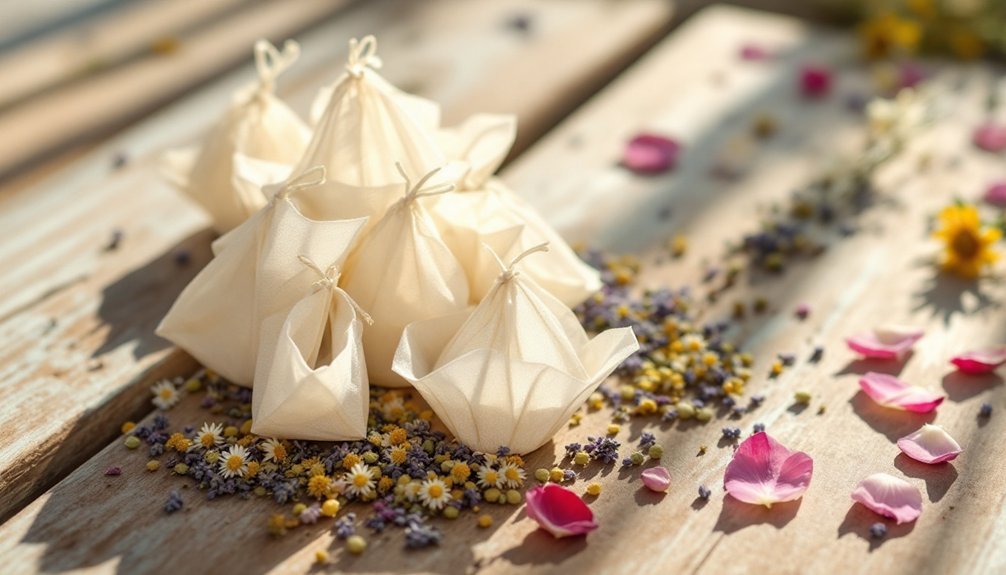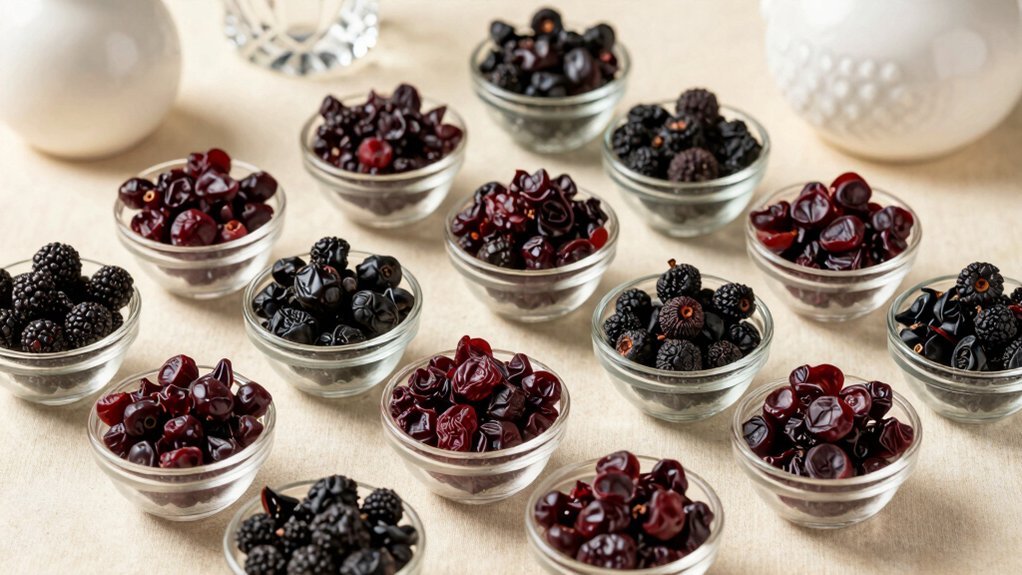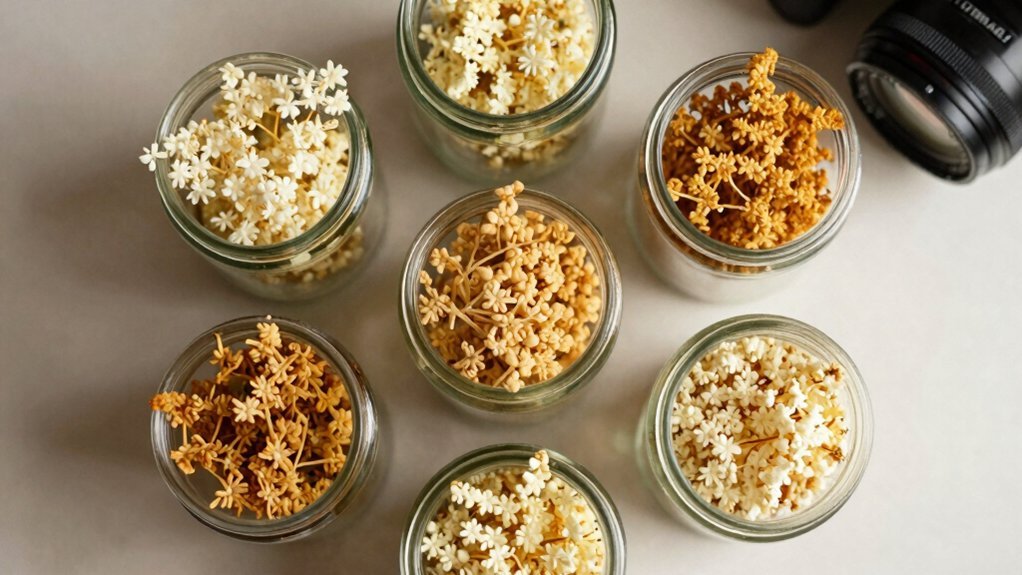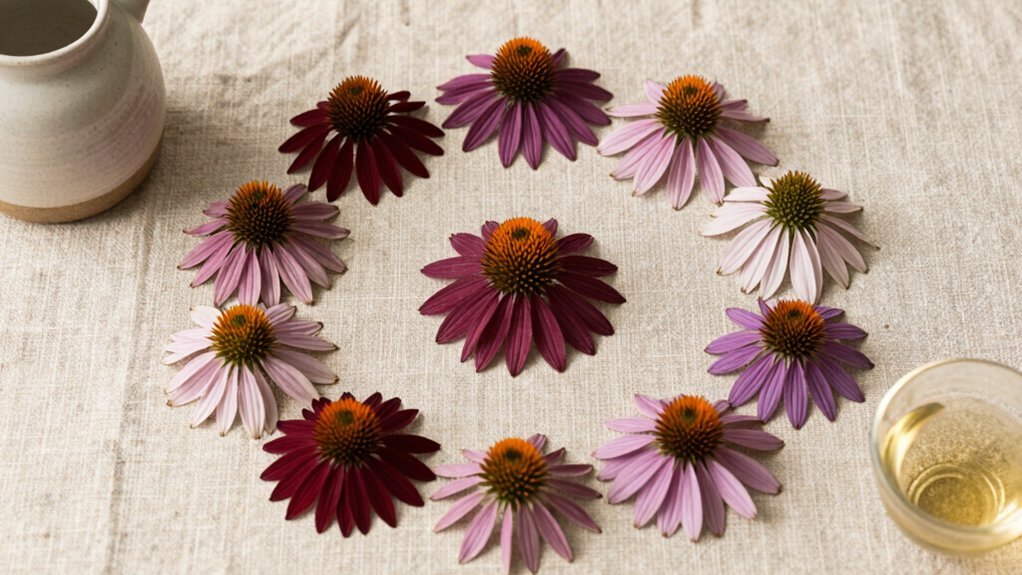If you're passionate about crafting your own herbal tea blends, you'll quickly discover that standard-size tea filters won't cut it. Larger tea filters give your herbs and botanicals the space they need to fully expand and release their flavors. From disposable paper options to durable stainless steel infusers, the right filter can transform your tea-making experience. Let's explore five exceptional large-size tea filters that'll help you brew the perfect cup every time.
Fenshine Large Tea Filter Bags (100 Pcs)
The Fenshine Large Tea Filter Bags offer an ideal solution for DIY tea enthusiasts who need ample space for their loose-leaf creations. At 4 x 6 inches, these biodegradable filters give you plenty of room for tea leaves to expand and release their full flavor.
You'll appreciate the eco-friendly material – they're made from corn fiber mesh that's both biodegradable and non-toxic. The 13cm drawstring makes it easy to secure your tea blend, and you won't find any weird smells or taste alterations. Beyond tea, you can use these versatile bags for coffee, spices, herbs, and even foot baths. With 100 bags per package, you'll have plenty for all your brewing needs.
Best For: Perfect for tea enthusiasts who prefer loose-leaf brewing, value eco-friendly products, and want versatile filters that can accommodate larger quantities of tea leaves and other ingredients.
Pros:
- Large 4×6 inch size provides ample room for tea leaves to expand fully for optimal flavor extraction
- Made from biodegradable corn fiber mesh that's environmentally friendly and doesn't affect taste
- Versatile enough for multiple uses beyond tea, including coffee, spices, herbs, and foot baths
Cons:
- Some customers report issues with drawstring durability
- Price point may be higher than non-biodegradable alternatives
- Size might be excessive for single-cup brewing needs
Eco-Fil Disposable Tea Filter Bags for Loose Tea (100 Pack)
Perfect for eco-conscious tea enthusiasts, Eco-Fil's disposable tea filters combine convenience with environmental responsibility. Made from unbleached wood pulp, these biodegradable bags are glue-free and compostable.
You'll find these 3.2×4.0-inch filters versatile enough for tea, coffee, herbs, and even bath soaks. Their excellent permeability guarantees proper steeping while keeping leaf particles contained. They're sturdy enough for microwave use and can withstand multiple steeps if handled carefully.
With a 4.6-star rating from over 9,000 customers, these filters prove their worth in both quality and functionality. You'll appreciate their generous capacity and time-saving convenience compared to traditional metal infusers.
Best For: Eco-conscious tea drinkers who want a convenient, disposable option for brewing loose leaf tea while minimizing environmental impact.
Pros:
- Biodegradable and compostable materials make them environmentally friendly
- Versatile usage beyond tea, including coffee, herbs, and bath products
- Excellent permeability prevents leaf particles while allowing proper steeping
Cons:
- Single-use design, though can be reused carefully a few times
- May cost more than traditional metal infusers in the long run
- Limited size might not be ideal for larger batch brewing
Finum Paper Tea Filter Bags for Loose Tea (100 Count)
Dedicated tea enthusiasts who enjoy brewing large batches will find Finum's disposable paper filters essential for their DIY tea blends. These German-made filters feature a practical pleated bottom design that stands open for easy filling, while their unbleached, FSC-certified paper guarantees an eco-friendly brewing experience.
You'll appreciate the convenience of the filling flap that seals like a tea bag, though some users suggest using clips for better handling. The filters excel at containing fine particles that traditional infusers miss, making them perfect for pitchers and large pots. At roughly a nickel per use, they're an economical choice that's earned high praise from customers, with a 4.7-star rating from over 1,400 reviews.
Best For: Tea enthusiasts who brew large quantities of loose leaf tea and prefer an eco-friendly, disposable filtering solution for both fine and coarse tea varieties.
Pros:
- Environmentally friendly with biodegradable, FSC-certified unbleached paper
- Pleated bottom design stands up for easy filling and handles fine tea particles effectively
- Economical choice at approximately five cents per filter with excellent durability
Cons:
- Some users report difficulties with keeping the bags properly sealed
- May require additional clips or tools for optimal handling
- Limited availability may necessitate bulk purchasing to ensure steady supply
Tiesta Tea Loose Leaf Disposable Tea Filters (100 Count)
Savvy tea enthusiasts seeking convenience without compromising quality will appreciate Tiesta Tea's disposable filters. These 100% natural unbleached paper filters hold up to 2oz of loose tea and provide ample space for leaves to expand, ensuring ideal flavor extraction.
You'll find these filters incredibly versatile – they're perfect for hot tea, iced tea, and even coffee. The chlorine-free paper won't affect your brew's taste, and you won't need to clean any strainers. While some users wish for pull strings, you'll likely appreciate the eco-friendly design and sturdy construction. They're especially handy for travel, gatherings, and seasonal tea blends throughout the year.
Best For: Tea enthusiasts who want a convenient, disposable solution for brewing loose leaf tea without the hassle of cleaning traditional strainers.
Pros:
- Made from 100% natural unbleached, chlorine-free paper that doesn't affect tea taste
- Spacious design allows tea leaves to fully expand for optimal flavor extraction
- Versatile use for hot tea, iced tea, coffee, and travel-friendly
Cons:
- Lacks pull strings for easier handling and sealing
- Limited to single-use applications, creating more waste than reusable options
- May need to use multiple filters for larger brewing quantities
Reinmoson Extra Large Tea Infuser with Fine Mesh Strainer
Tea enthusiasts who love brewing large batches will find their match in the Reinmoson Extra Large Tea Infuser. With its 3.2-inch diameter and 13-ounce capacity, you'll have plenty of room for your favorite loose leaf teas.
The 304 food-grade stainless steel construction features an extra-fine mesh that prevents sediment leakage while allowing full flavor extraction. You'll appreciate the secure threaded lid and 7.7-inch chain with hook that keeps the infuser safely attached to your container.
Beyond tea, you can use it for infusing spices in soups, broths, and stews. It's dishwasher safe and ranks #1 in Tea Filters with a 4.7-star rating from over 5,000 reviews.
Best For: Tea enthusiasts and home cooks who want a large-capacity, versatile infuser for brewing loose leaf teas and infusing spices in cooking.
Pros:
- Generous 13 oz capacity allows brewing of large batches
- Extra-fine mesh prevents sediment leakage while ensuring full flavor extraction
- Versatile use for both tea brewing and cooking applications
Cons:
- Size may be too large for standard tea cups
- Cannot be used with salt or chlorides due to potential corrosion
- Relatively heavy at 3.17 ounces compared to smaller infusers
Factors to Consider When Choosing Large-Size Tea Filters for DIY Herbal Tea Blends
When selecting large-size tea filters for your DIY herbal tea blends, you'll want to check the materials for food-grade safety certification and proper mesh size to contain your botanicals effectively. Your filter should offer adequate capacity for the herbs to expand while steeping and withstand your desired brewing temperatures without warping or leaching chemicals. Consider features like easy-grip handles and environmentally sustainable materials that'll make your tea preparation simpler while reducing your ecological footprint.
Material Safety and Composition
Safety-conscious herbal enthusiasts should prioritize material composition when selecting large-size tea filters for their DIY blends. You'll want to choose filters made from biodegradable materials like PLA derived from corn starch or unbleached wood pulp paper, as these options minimize environmental impact while guaranteeing safe brewing.
When examining filter materials, it's essential to verify they're non-toxic and chemical-free to maintain your tea's purity. The material shouldn't release any unwanted flavors or odors that could alter your herbal blend's natural taste. Look for filters with strong tenacity to prevent tearing during steeping, and make sure they offer ideal permeability for proper water flow while containing fine particles. These characteristics will help you achieve the best brewing results while keeping your herbal tea preparation safe and eco-friendly.
Filter Size and Capacity
Selecting the right filter size and capacity stands as an essential factor for successful DIY herbal tea brewing. You'll want to choose filters that measure at least 4 x 6 inches, as this size provides ample space for your herbs and spices to release their full flavors during steeping.
Look for filters that can accommodate up to 2oz of loose leaf tea, which guarantees proper extraction without overcrowding your blend. The pleated bottom design is particularly important – it allows your filter to stand open while you're filling it and gives herbs room to expand as they steep. When you're shopping for filters, you'll find that this expanded capacity leads to better-tasting tea and a more efficient brewing process overall.
Environmental Impact Assessment
Beyond the physical dimensions of tea filters, their environmental footprint plays a major role in sustainable brewing practices. You'll want to choose filters made from biodegradable materials like PLA or unbleached wood pulp, as they'll naturally decompose and enrich soil instead of lingering in landfills for centuries like plastic alternatives.
Look for tea filters with environmental certifications, such as FSC approval, to guarantee you're supporting sustainable forestry practices. By selecting compostable options, you're contributing to a circular waste management system and reducing the significant plastic pollution associated with traditional tea bags. When you opt for eco-friendly filters, you're not just making tea – you're making a conscious choice to minimize your carbon footprint and support environmentally responsible manufacturing in the tea industry.
Ease of Use Features
The practical features of large-size tea filters can make or break your DIY tea brewing experience. When selecting filters, you'll want to focus on features that enhance convenience and functionality.
The drawstring closure should be your top priority, as it securely seals tea leaves and prevents them from floating freely in your cup. Look for filters measuring around 4 x 6 inches or larger, which provide ample space for your tea blends to expand and release their full flavor. You'll also benefit from filters with excellent permeability that keep fine particles contained while allowing proper steeping.
For maximum versatility, choose sturdy filters that can withstand different brewing methods, including microwave and pressure cooker use. If you're environmentally conscious, opt for biodegradable materials like corn fiber mesh or wood pulp, which won't affect your tea's taste.
Brewing Temperature Tolerance
Just as important as ease of use is your filter's ability to handle high brewing temperatures. When brewing herbal teas, you'll need filters that can withstand temperatures between 190°F and 212°F (88°C to 100°C) for best extraction of flavors and beneficial compounds.
Look for filters made from heat-resistant materials like food-grade stainless steel or high-quality paper that won't melt or degrade during steeping. You'll want to verify the filter's permeability allows hot water to flow freely while keeping herbs contained. The filter should also have enough space for your herbs to expand during brewing without bursting. Before making your purchase, check user reviews specifically mentioning temperature performance – they'll give you valuable insights into how well the filters hold up under real brewing conditions.
Durability During Steeping
When selecting large-size tea filters for your DIY blends, durability becomes paramount to prevent herbs from escaping during steeping. You'll want to look for filters made from high-quality materials like biodegradable PLA or unbleached paper that offer both strength and eco-friendliness.
Pay attention to the filter's permeability and seam construction. The best options feature reinforced seams that won't split when holding larger quantities of loose tea. You'll also benefit from filters with ideal water flow that keep tea particles contained while allowing full flavor extraction. Many users report that sturdy filters can handle multiple steeping sessions without losing their integrity.
Check the weight capacity ratings to confirm your chosen filters can accommodate your preferred amount of herbs without risking tears or breakage during the brewing process.
Cost Per Filter Analysis
Beyond durability considerations, understanding the cost implications of tea filters can help you make a smart investment for your DIY herbal blends. You'll find significant price variations among brands, with costs ranging from five to ten cents per filter. When buying in bulk packs of 100, you can expect to spend between $5 and $10 total.
While biodegradable and compostable options might cost more upfront, they provide environmental value that could justify the higher price. Consider reusable filters, as they'll reduce your cost per use compared to single-use alternatives. Before making your final choice, check customer ratings to identify filters that offer the best balance of durability and performance for your money. This research can help you avoid spending more in the long run on frequently replacing lower-quality filters.
Storage and Shelf Life
Proper storage plays an essential role in maintaining the quality of your large-size tea filters. Keep them in a cool, dry place away from direct sunlight to prevent material degradation and maintain their effectiveness. UV rays can weaken the filters' structure, while moisture may compromise their integrity.
While biodegradable filters typically last 1-2 years, you'll get the best results if you use them within the first year of purchase. This is particularly true for filters made from natural materials, which tend to break down more quickly than synthetic alternatives. Always check the package for specific expiration dates and guarantee you're storing them in a sealed container to prevent unwanted odors from affecting your tea's taste. Proper storage will help preserve the purity of your herbal blends.
Frequently Asked Questions
Can I Reuse Disposable Tea Filters More Than Once?
You shouldn't reuse disposable tea filters as they're designed for single use. They'll become weak and can break apart after the first use, potentially leaving paper fibers in your tea during subsequent steepings.
How Long Can I Store Filled Tea Bags Before Using Them?
You can store pre-filled tea bags for up to 6 months if you keep them in an airtight container in a cool, dark place. They'll stay fresher if you don't expose them to moisture, heat, or sunlight.
Are These Filters Safe for Boiling Water Temperatures?
Yes, you'll find that most tea filters are designed to safely withstand boiling water temperatures. They're specifically made for hot steeping, so you don't need to worry about them melting or releasing harmful chemicals.
Will the Filters Affect the Taste of My Herbal Tea Blends?
You won't notice any taste alteration from quality tea filters. They're designed to be flavor-neutral, letting your herbal blends shine through naturally. Just make sure you're using unbleached, food-grade paper filters.
Can These Filters Be Composted After Use in My Garden?
Yes, you can compost most paper tea filters in your garden. They'll break down naturally along with your tea leaves. Just make sure you're using unbleached filters without synthetic materials or staples.





Leave a Reply